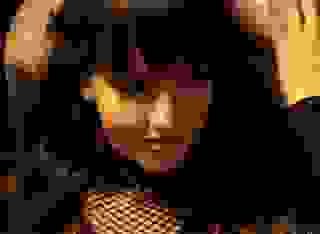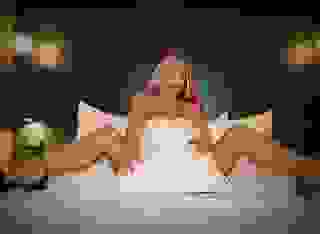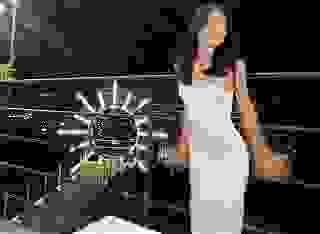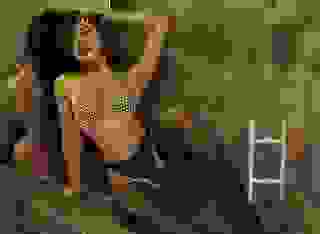Note: You can change font size, font face, and turn on dark mode by clicking the "A" icon tab in the Story Info Box.
You can temporarily switch back to a Classic Literotica® experience during our ongoing public Beta testing. Please consider leaving feedback on issues you experience or suggest improvements.
Click hereHi Kerry, I know this is a long shot, but I'm trying to identify the woman in this photo, just behind Henry Winstone in the black and gray checks. She looks familiar and I'm trying to figure out who she might be. Do you know anybody who'd know?
Five minutes after sending that email, I figured it out for myself, and felt pretty stupid. There was a simple enough explanation.
* * * * *
Monday night, Mel had a new book: "HeLa and Mrs Lacks: A Study in Medical Ethics". I knew a little of the case from my nursing training, but as I discussed the book with Mel I learned a lot more.
Henrietta Lacks was a black woman who died in 1951 of cervical cancer, caused by infection with human papillomavirus. When a virus gets into your body it infiltrates your cells and subverts them to make copies of itself. Mostly that's not a big deal—you lose a few cells to the virus, but your immune system recognizes it as an alien organism and wipes it out, or at least keeps it in check. But sometimes you get something that's neither one or the other: a dividing cell gets corrupted by the virus, so you end up with something that's not quite you, but close enough that your immune system accepts it. Part human, part virus.
Most of the time that too is harmless: the mutation does nothing important, or it causes the cell to kill itself. But once in a while you get the opposite: a cell that refuses to die by the normal rules, one that keeps growing and reproducing forever. Cancer.
Even so, most cancers are self-defeating. In their greed they kill you, and without you, they die. Henrietta Lacks' cancer was different: given a little food, it would happily thrive in a test-tube, reproducing forever, like an independent bacterium. The discovery of a human-like cell that could easily be grown in vitro was a huge boon to medical research; from polio vaccination onward, almost every human being in existence today has benefited in some way from HeLa research. Mrs. Lacks was only thirty-one when she died; sixty-three years later, there are many tons of HeLa cells living and growing in laboratories around the world.
But for many years, researchers forgot that those cells came from a person. Her family were never notified that her cells had been taken and used for study; they only found out twenty years after her death, when researchers started calling them asking for more information about the family's genetics. Some people got rich off of patents based on HeLa cells, but none of the money ever went to her children.
"Even aside from the treatment of the family," Mel said, "it raises some interesting ethical questions. A jar of HeLa cells, is that human? If you starve it, is that murder?"
"Not to me. I mean, medically yes, it's related to humans. But ethically, no. HeLa doesn't have a mind, no emotions, no desires."
"Well, it has one. It has the will to go on living, and it's very good at it. And if you're going to say HeLa isn't human because it doesn't have a mind, well..." She waved her hands around her, as if to say: all this. The hospital, the Board of Trustees, the Church. "Every sperm is sacred, you know. If a mindless zygote is as much of a human being as you are, why does HeLa have any less right to life?"
"Asking the wrong person. You want to debate Catholic medical ethics, talk to Father Julian or the Board. It's not my position."
She nodded. "I know. I just find it interesting to think about what people do and don't consider human."
* * * * *
"Mel, can I ask you a personal question?"
"Hmm?"
"Is it possible you're related to Henry?"
She closed what she was reading, a collection of Sylvia Plath, and turned to me. "Now that's a peculiar thing to ask. Why would you think a thing like that?"
I handed her the scrapbook; I'd bookmarked the page. "Your mother, I take it? Or grandmother?"
Mel looked at the article, pressed her lips together. "Oh, my. I had no idea he had a copy of this."
"I've met Maisy Winstone and you don't look anything like her. But if I have my dates right, this was just before she came on the scene. Seems like quite a coincidence that you'd show up at the same nursing home where Henry is."
She smiled at me but said nothing.
"Does he know who you are?" And I remembered: he'd known her name from the first day she worked there, he hadn't spent weeks fighting the Korsakoff's to learn it the way he had mine.
Mel closed the book and handed it back to me. "He has...some idea. Yes, I suppose you could say we're related. It's complicated." Then, the last thing I'd expected, she slid to her feet and kissed me, and my heart went pitter-patter. For a moment her arms were around me, and I started to wrap mine around her, and then she drew back again. "I'm sorry. I shouldn't have done that. But I wanted to."
* * * * *
I no longer felt jealous of the time they spent together. If she was his grand-daughter (daughter?) I could understand it, especially if they'd been out of touch for a long time. I wondered if he really understood who she was, how much of it he'd forgotten.
Perhaps in time she'd tell me more, when she felt comfortable with it. But I didn't need to rush her—or so I thought.
* * * * *
I got the first email Tuesday afternoon:
Don't know her but I've passed your query on to a guy in our photo archive, will let you know what he says - Kerry
I thought about telling him not to bother, but I was nosy enough that I still wanted to know more than Mel had told me, so I let it go.
The next email arrived a couple of weeks later, while I was at work, but I couldn't view it at the time—the message was almost a hundred megabytes—and anyway, I didn't want to look at it while Mel was around. So I waited until I was home again.
Hi, Joe Hathcock here. Kerry sent me a clipping and gave me your address. I've attached some photos which you may find interesting. Would love to know what you make of it.
"Interesting" was putting it mildly.
Several dozen photo attachments, all dated and referenced as meticulously as you'd expect from a professional archivist. A few were from big-name magazines like Rolling Stone, Kerrang!, Country Music, Spin; many more were from small-press outfits I'd never heard of.
I recognized some of the artists from the photos, and others by name: Nirvana, Roy Buchanan, Johnny Ace, Alice in Chains, Janis Joplin, Badfinger, Jimi Hendrix, Led Zeppelin. There were others I hadn't heard of, a few old and obscure enough that I couldn't find them on the net. The most recent was dated last year; the earliest was a bluesman from the 1930s by the name of Chet Hardacre. And somewhere in each photo was Mel.
Sometimes she was obvious; sometimes I had to hunt for her in the background, scanning a crowd for those black-and-gray checks like a rock-and-roll version of "Where's Waldo?" But she was always there, in 1933 and 1942 and 1967 and 2012.
I spent an afternoon looking up the artists and matching the photo dates to their career milestone. Perhaps "headstones" would be a better word. An awful lot of them were dead within a year or two of the photos. Suicides, ODs, reckless accidents—quite a few members of the 27 Club in there.
Not all of the photos fit that pattern. Several were taken right at the start of a promising career, young men and women about to become famous, grinning at the cameras with the same optimism I'd seen on the faces of the Six Strings.
I couldn't keep on kidding myself that it was a relative. Not unless she had a mother and a grandmother and a great-grandmother who all looked exactly like her. Which left...what?
* * * * *
Sitting in my car, parked not too close and not too far from the entrance to Building H. Huddled in a blanket to keep out the cold, sipping from a thermos of coffee. I'd brought the knife because I couldn't think of any better ideas. It was Saturday, my night off. I didn't know if Mel took nights off.
I've sometimes wondered what I'd do if I started developing dementia. Whether I'd let it slowly steal me away until there wasn't enough left of me to understand what had happened, or if I'd choose my own way out. Perhaps if I was in Henry's shoes I wouldn't mind whatever it was that Mel had in store for him. But it wasn't my life to make that decision, and it wasn't hers either. He was my patient to protect.
Watching, waiting, without any coherent plan.
The first tap on the window was the cops. I told them—I can't even remember, I think it was some bullshit about waiting for a friend whose mother was dying in the hospital. Whatever it was, it satisfied them.
The second tap was her. In those harlequin checks, with a half-smile dancing on her lips.
* * * * *
"I saw the other pictures. You really get around, Mel."
"Ah. This is awkward, isn't it? I take it you're not going to let me in without making a fuss."
I shook my head, wondering how quickly I could reach the knife, whether it would do me any good. And even if it did, how I'd explain that to the cops later.
"You might not believe me, but I respect your sense of duty. Shall we talk about this?"
"What did you have in mind?"
"Why don't we go somewhere more comfortable? I know a good place, or you can pick."
"Okay. Whatever." I unlocked the doors, wondering if that was going to be the last bad decision I ever made. Mel walked around to the passenger side and stood there, smiling, until I asked: "Or do you need an invitation?"
"Heh. No, I don't need to be invited." She opened the door and climbed in beside me.
* * * * *
I remember driving through the city, taking it slow in the fog that reflected my lights back at me. Mel must have chosen our destination, because the route was unfamiliar to me, but I don't remember her giving me directions.
A night diner named "Crossroads". We were side by side in a corner booth; there were no other customers. Come to that, I don't remember anything about the staff, if there were any. But there was coffee, black as night, bitter as hell.
"You're not human," I said.
"I'm as human as HeLa, put it that way."
"What are you?"
"A nurse. Of a sort. More like a midwife, really. No silver bullets for my kind, if that's what you're asking."
"You can't have Henry. You have no right."
"Really? What do you suppose my intentions are for Henry?"
"You're going to kill him."
She shook her head energetically. "No, no, no! Yes, it might happen. He's an old man and he's fragile, I make no guarantees. But I'd be sorry if it did. That's not my intention."
"Sorry enough to leave him alone?" I wasn't even sure what we were talking about; I was just trying to draw her out.
"Not that sorry." She stroked the back of my hand with one finger, and I flinched, but I didn't pull away. "Sorry like...like the way a wasp might feel if she was able to understand that the caterpillar that feeds and protects her babies used to have plans of its own. If she was a kindly sort of wasp, she'd be happier if the caterpillar lived. But then, from her perspective, it's not so horrible. What greater honor for the caterpillar than to play a part in giving life to something as magnificent as a wasp?"
Steam rose from her coffee as I tried to understand. Then she patted my knee. "You made me an offer once. Are you still interested?"
* * * * *
John Waters once said: "If you go home with somebody, and they don't have books, don't fuck 'em!"
Mel had books, an entire wall covered from floor to ceiling with shelves, holding everything from Greek tragic poets to a bio of Évariste Galois. The wall next to that was dedicated to music, what looked like a custom-built storage unit holding several hundred LPs, CDs, even a few old reel-to-reel tapes. The sound system was playing "Gloomy Sunday" in what might have been the original Hungarian.
The door closed behind me. "I don't have people here often," she said.
"Am I people? Or am I the caterpillar?"
"Not tonight. For now, you're company."
"And tomorrow?"
"Who knows?" Then she was on me, fingers in my hair, lips on mine, and we were down on the floor. Her touch made my skin tingle, like the shock of walking barefoot on snow; every kiss sent a delicious shudder through me. Intuitively I understood that a long-term relationship with Mel would be a prescription for drama and tears, of lonely nights spent wondering where she was...and in that moment, I could think of nothing I wanted more.
But she had gentler things in mind that night, warmth and company. We held one another, kissing slowly, undressing one another gradually: a knot here, a button there. I don't remember the order of things; all I know is that by the time we made it to her bedroom, I'd dispensed with the last of my clothes. But somehow although she'd lost shoes, socks, underwear, she was still in that harlequinade.
"So, do you ever take that off?" I asked.
"Hardly ever. But for you, I will."
And the dappled creature I'd known as Mel set its human semblance aside, and came to me naked in its black-and-gray splendor.
* * * * *
"Henry," I asked, "when did you first meet Mel?" She wasn't in that day; Dhipa was back, watching her soaps while I talked to our late-night musician.
"Oh...long time ago. Back when I was gettin' started. Can't recall how I knew her, but she helped me with my music."
"Helped write it?"
"Not 'zactly. Already had it in my head, she just helped me get it out, know what I mean? I was scared nobody would like it. She said, what's that matter, good or bad, can't you feel those songs wanting to be sung? Just play it already. So I did." He shrugged. "Guess some people liked it."
"You said you were working on something new. Would you play it for me?"
"You sure? I don't want to disappoint. Don't want to be a joke like Elvis." It took me a moment before I remembered: to him the King was still alive, a bloated caricature of his old glories, not yet beatified by death and distance. And Henry was still cursed with enough self-awareness to have some idea of his own impairment.
"It's okay. Good or bad, I'd like to hear it."
I'd like to tell you there was a miracle in Room 8B: that a brain-damaged old man put his illness aside and rediscovered his old talent, played me something wonderful that nobody else had ever heard. But that's not how these things work. If there was any kind of greatness in the song he had in mind—if it was even his own invention, and not some confused pastiche of other people's work he'd assimilated and misremembered as his own—then his palsy-fogged fingers didn't do it justice. The melody was confused and badly out of tune. He rambled and repeated himself and seemed to jump around, and at the end it just trailed off into nothing.
And yet, for all that, at least he sang it, and I heard it. Isn't that what any song wants?
* * * * *
It slips away so easily. I've been up for hours writing this down. My back hurts from sitting in this chair, my eyes are red, I ought to have been in bed long ago. But I'm afraid that if I sleep the last of this will be gone, and when I read my notes tomorrow I'll think it nothing more than an elaborate fantasy.
I asked Dhipa how she'd enjoyed her holiday, and she gave me an odd look. "Holiday?"
"You were away."
"Oh, that was very nice. I went home and saw my sisters and my new nephew. But that was six months ago, why do you ask?"
"No, I meant—oh, never mind, I think I'm confused."
When I checked the roster. Dhipa's signature was next to mine in the log-book, night after night. There was no record that Mel had ever been there. And although I'm sure I saved Joe Hathcock's email, I can't figure out which folder I put it in. I considered asking him to re-send, but something tells me he'd have no idea what I was talking about. And even if he did, would I want to answer his questions?
Henry is okay. His heart and liver aren't what they might be, and Dr. Chang left a crabby note for the graveyard shift about the importance of making sure he keeps a regular sleep cycle, but he's still going. I never heard him play that song again; these days he seems content to pick out his old favorites.
He once told me: a song's like a baby. But whose baby?
Are we the parents of the songs we sing, the stories we tell? Or are we just the caterpillar, the host for something that evolved from us?
She told me one of the larvae stays behind to protect the rest of its brood. And I wonder: is that what she was? A wasp's midwife, helping to bring her own kind into the world, regardless of what that might mean to the caterpillar?
I remember Mel made me an offer the night we spent together, but I don't remember what it was, or what I answered. All I know is that my mind itches and I'm awake five hours after I should have been in bed, writing, writing.
And in a corner of my mind, I hear Robert Johnson singing forever about the blues that walked like a man.
THE END
Author's note: Thanks as always to my partner for her proofreading, feedback, and support. Thanks also to friends who encouraged me with this one.
If you want to be notified when I have new stories up, you can click on my name below to view my profile and then use the Contact tab to send me your email address.
- COMMENTS
I usually can accept story endings and move on, but I believe this story and "Magnum Innominandum" will be among those that haunt me for some time. I attribute this somewhat to the subject matter but mainly to the author's skill in telling the story; I stand in awe and appreciation.
Awful and magnificent! I’m as disturbed by the facts you included as the fiction. Truly impressive writing. I’d be happy if I’d be able to write even as well as some of the previous comments you’ve had here, but all the same, I just wanted to tell you I loved this.
Ah yes, I do recall reading this some time ago. Most impressive! Thanks for the link. EB
"Naked people have little or no influence on society." ~Mark Twain
It's much the same with stories and quotes. It's a talent to weave just the right quote within a story, so this: "John Waters once said: "If you go home with somebody, and they don't have books, don't fuck 'em!" put your story over the top for me. And the tale was quite clever to begin with.








